While all EU leaders backed conclusions on bolstering European defence, the Hungarian prime minister opted out of the statements on the bloc's ongoing support to Kyiv.
Hungarian Prime Minister Viktor Orbán has opted out of joint EU conclusions on support to Ukraine in a crunch summit in Brussels, forcing those statements to be adopted by the remaining 26 member states.
All leaders meanwhile agreed on statements on bolstering the bloc's collective defence, which referenced a five-point initiative unveiled earlier this week by European Commission chief Ursula von der Leyen aimed at injecting new cash into rearming the continent.
Speaking to reporters late on Thursday evening, European Council President Antonio Costa defended the bloc's unity, saying that "Hungary is isolated - 26 are more than one."
The extraordinary summit was initially convened in response to the US-Russia talks on Ukraine's future, and was framed as a joint display of the EU's willingness to step up its efforts to support Ukraine in the short term and ensure its strategic autonomy to defend itself in the long term.
After meeting with EU leaders and the NATO Secretary-General on Thursday, President Zelenskyy confirmed that Ukrainian and American officials will meet in Saudi Arabia for talks next week, in a sign of a détente after relations between both sides came under severe strain following Zelenskyy and Trump's clash in the Oval Office last week.
Speaking after the summit, French President Emmanuel Macron outlined the potential security guarantees discussed by leaders. They included the potential deployment of foreign troops as part of a peacekeeping force in Ukraine, a prospect Giorgia Meloni ruled out for Italian troops.
Catch up with our rolling coverage below.

 ${title}
${title}
Live ended
'Hungary is isolated,' says António Costa
"Hungary is isolated," António Costa declared on Thursday at the end of a special EU summit that saw Viktor Orbán block the approval of joint conclusions in support of Ukraine, forcing leaders to go ahead with an attached "extract" endorsed by 26.
The final text speaks about "peace through strength," military assistance and security guarantees for Kyiv, all of which Orbán has opposed.
"Hungary has a different strategic approach on Ukraine," Costa, the president of the European Council, said at the end of the high-stakes meeting in Brussels.
"That means that Hungary is isolated among the 27. We respect Hungary's position, but it's one out of 27. And 26 are more than one."
Read our final piece from today's special EU summit.
With this, we conclude our live blog for the night. Thank you for reading.
‘Hungary is isolated,’ Costa says after Orbán blocks Ukraine text
“We respect Hungary’s position, but it’s one of out 27. And 26 are more than one,” António Costa said after an EU summit focused on Ukraine’s future. #EuropeNe…
Orbán on Zelenskyy: 'He's the president of Ukraine and I respect all the leaders of sovereign countries'
Speaking at the exit doorstep in Brussels, Hungary's Prime Minister Viktor Orbán briefly touched on his relationship with Ukrainian Prime Minister Volodymyr Zelenskyy.
"He is the president of Ukraine and I respect all the leaders of sovereign countries," the Hungarian PM said.
When asked if he thought Zelenskyy was the right person for peace talks, Orbán simply replied: "You know, he's the leader of Ukraine."
Orbán strongly aligns himself with the new administration of US President Donald Trump, who recently called Zelenskyy a "dictator".
At the end of January, Trump claimed the Ukrainian leader's role was "illegitimate" as no elections have been held since Russia launched its full-scale invasion of Ukraine.
'Huge pressure' on all EU countries to ramp up defence spending, says von der Leyen
After a summit dedicated to Ukraine and defence, Ursula von der Leyen said the sense of urgency was "real" and that all 27 member states were under "huge pressure" to rapidly increase their military spending to protect themselves against Russia's expansionism.
During the meeting, von der Leyen presented her ReArm Europe plan to mobilise up to €800 billion in additional investments for defence, receiving broad endorsement from the room. The package contains €150 billion in low-interest loans that each country has to request according to its needs.
"I'm absolutely confident that it will be used," von der Leyen said when asked about the potential uptake of the loans. (Most of the loans under the COVID recovery fund were left unused.)
Von der Leyen, however, admitted that the favourable loans would be interesting for about 20 countries that see higher costs in the financial markets than the European Commission does. Those in greater financial shape, like Germany and the Nordics, might not see the point in requesting an EU-backed loan, and they might, instead, go to the markets themselves to raise fresh debt.
Putin 'going against the grain of history': Macron
Asked about comments made earlier in the day by Vladimir Putin in response to the French president's assertion the day before that Russia is "a threat to France and Europe", Macron said the Russian leader "is going against the grain of history".
Without citing Macron, Putin said that "some people still can't sit still. There are still people who want to go back to the times of Napoleon, forgetting how it ended."
Macron told reporters: "I know President Putin well, so if he's reacting like this, it's because he knows I'm telling the truth and that I know that he can betray the agreements he signs, he's already done so."
"Secondly, I think he's going against the grain of history, and that surprises me. Napoleon led conquests. The only imperial power I can see in Europe today is Russia, and he's an imperialist, a revisionist of history and of the identity of peoples."
"He was undoubtedly stung by the fact that we unmasked his game. If there is a ceasefire, it will not be to make lasting peace but to allow Russia better to resume the war," Macron added.
Orbán: 'We are not isolated at all.'
26 member states agreed on a joint conclusion on Ukraine, with Hungary's Viktor Orbán refusing to back the text. When asked by a reporter if Hungary has isolated itself, Orbán said "We are not isolated at all."
"The isolation is relevant to the European union," The Hungarian Prime Minister said at the exit doorstep following the summit. "The European union has isolated itself from the US, isolated itself from China because of the trade war, and isolated itself from Russia because of the sanction policy."
"Hungary has good relations to all three directions, so we are not isolated at all," he concluded.
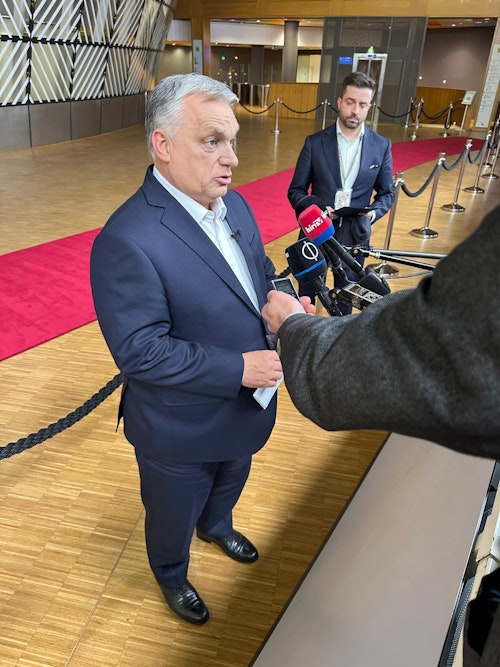
'Best security guarantees are the Ukrainians themselves' - European Council President
"The best security guarantee are the Ukrainians themselves," according to European Council President Antonio Costa.
"We will explore our capabilities in the treaty framework to contribute for security guarantees," he then went on to say. "Of course, security guarantees for the future of Ukraine are essential for the security of Europe, but also for international security."
"Because this war is not only about Ukraine, it's about the respect of international law, respect of the international rules-based order, sovereignty, territorial integrity, safe borders."
Key security guarantee is 'a strong Ukrainian army' - Czech prime minister
"For us, the key security guarantee is a strong Ukrainian army," Czech prime minister Petr Fiala told reporters in the wake of today's summit, Euronews' Mared Gwyn Jones reports.
"That is why the EU, this is also a consensus, is ready to increase military and financial assistance, saying that we want to keep the door open in the integration of Ukraine of the future into the EU."
It would suggest Prague is favouring the first of the three potential security guarantees outlined by French President Emmanuel Macron earlier, which is to fortify the Ukrainian armed forces in a way that allows it to "resist" Russian aggression.
Macron updated Starmer on summit
Emmanuel Macron also informed reporters that he spoke with British Prime Minister Keir Starmer in the evening to brief him on his bilateral with Ukrainian President Volodymyr Zelenskyy as well as the discussions with the other 26 leaders.
He also said he would speak to interlocutors in the US in the coming hours.
Kaja Kallas hails 'important steps' to 'speed up weapons production and deliveries'
The EU's top diplomat Kaja Kallas has said on X that "today, Europe took important steps to invest more in defence and speed up weapons production and deliveries."
"The moment is now. Ukraine must get what it needs to defend itself," Kallas added.
Where there is a will, there is a way.
— Kaja Kallas (@kajakallas) March 6, 2025
Today, Europe took important steps to invest more in defence and speed up weapons production and deliveries.
The moment is now. Ukraine must get what it needs to defend itself.
We need common debt and own resources to invest in defence: Macron
During his post-summit press conference, the French leader welcomed the ReARm Europe plan unveiled by the Commission earlier this week but said other innovative solutions including common debt and own resources to finance a ramp-up of defence production will be needed.
"I think that the freedom and budgetary space left to the national level is not a satisfactory solution, because there are many differences between member states, and if we really want to have major European programmes and a good European mutual [approach], we need European funding," he said.
Turning to the markets to raise money "is all the more relevant as it would enable us to overcome what is otherwise going to happen very quickly in terms of savings and the start of repayment of the loan taken out during the COVID period" and because it would enable the bloc to "mobilise massive amounts of financing".
"At the same time, I'm in favour of own resources. I've mentioned several possibilities this evening, including the famous digital tax," he told reporters.
Emmanuel Macron outlines security guarantees under discussion
French President Emmanuel Macron outlined some of the security guarantees under discussion after the summit
The first, he said, is the idea of putting Ukraine's armed forces in a position of strength:
"We all support the idea of a Ukrainian army of a size and nature capable of resisting Russian aggression, in other words, an army of several hundred thousand men with top-quality equipment," he told reporters. "On this point, I think I can say that the allies are unanimous. I haven't heard any of our European or non-European allies say: "we're not going to take part in these security guarantees"."
A second idea, one that Italian Prime Minister Giorgia Meloni floated, is to give NATO-like guarantees but without full-fledged membership but "so far, the United States of America has refused these mechanisms", Macron said.
The third is for the deployment of foreign troops in Ukraine. This, Macron said, would be done on "a national basis" to "secure" what he described as "calm zones" away from the frontline, which would "create a de facto solidarity of NATO member nations".
"This is a scheme that has been worked on by the Franco-British team, and extended to others," he told reporters, noting however that for all those interested, "the condition is the nature of American support".
"There will be initial exploratory discussions on this whole range of options" at a meeting of army chiefs Macron has convened for 11 March, the French leader said.
Photo credit: AP Photo/Omar Havana
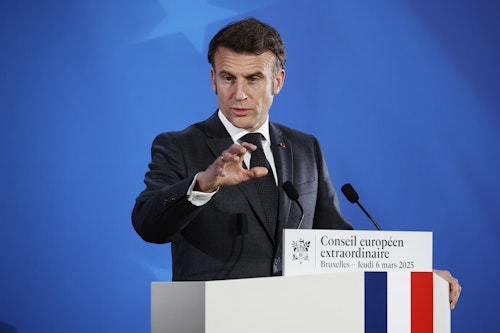
'We also need grants to finance defence’ - Sánchez
Spanish president Pedro Sánchez has said that member states need grants as well as loans from the EU to boost their defence expenditure. “Loans are not sufficient,” he told journalists after leaders’ wound up a special summit in Brussels, Euronews' Vincenzo Genovese reports.
“As during the period of Covid, we have begun discussing escape clauses for national budgets, and we ended with agreeing on European grants and loans,” he said in relation to the European Commission’s ReArm Europe plan, referring to the Next GenerationEU, a massive injection of money used during the pandemic.
Echoing Italian prime minister Giorgia Meloni, Sánchez appreciated some elements of the Commission's plan, but ruled out using cohesion funds to boost defence expenditure. “Cohesion funds are meant for development and will be used only for this,” he said.
Asked if Spain would deploy its own troops in Ukraine as a guarantee after a potential peace deal, the Spanish prime minister wavered. “This is not a question to be asked now. We are in the middle of a war, and we just have the duty to support Ukraine. Does Russia want peace? It seems not.,” he said.
Sánchez claimed that Russia represents the major, though not sole, threat for Spain and Europe. He believes in a broad concept of security, which encompasses facing different kinds of threats, including cyberattacks and hybrid warfare. “The threats for Spain are different from that Poland faces, for example,” he said.
Diplomatic sources told Euronews that during the leaders’ meeting Spain lobbied to include a specific security reference to the "rest of the EU's borders", rather than only those on the eastern flank of the continent.
Germany's debt brake overhaul could be 'good solution' if mirrored at EU level - Chancellor Scholz
Speaking to reporters, German Chancellor Olaf Scholz suggested the EU could be inspired by the intention of Germany's two centrist parties, which are currently in coalition talks, to overhaul the country's so-called 'debt brake' in order to inject more money into defence spending.
Scholz and the Christian Democrat leader Friedrich Merz have proposed to reform the debt brake, which restricts Germany's deficit to 0.35% of GDP, so that defence spending above the level of 1% of GDP can be exempt from the limits.
Germany is now tabling a similar move at EU level by proposing to re-open the bloc’s fiscal rules, known as the Stability and Growth Pact and which aim to curb countries’ levels of deficit and debt, to consider exempting defence spending from the limits. This would go a step further than the plans unveiled by Commission chief Ursula von der Leyen earlier this week.
"We are in a very special situation when it comes to defence (...) because of this I think it's necessary that we take a decision that makes it possible that we spend more. And we couldn't be restricted (...) that's why we're discussing now in Germany about changing the regulations we have," Scholz explained.
"If you are doing it for yourself (...) I would say it is absolutely true that we should say this should be also a good solution for the EU," Scholz added, claiming that this shouldn't jeopardise financial stability.
When the Pact was recently reformed, Germany was among the EU countries firmly resisting defence expenditure being exempted from those rules.
One diplomat described Germany’s shift as “extraordinary”, with another saying it jars so much with Berlin’s traditionally “orthodox” stance that it is “difficult to interpret.”
Photo courtesy of AP Photo/Omar Havana
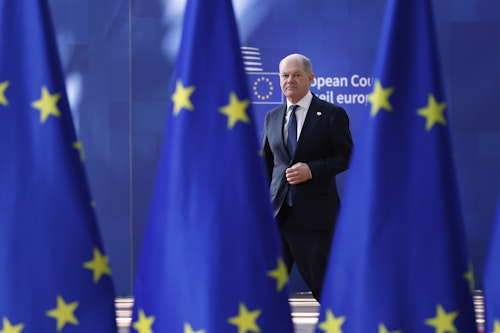
Discussion on Ukraine lasted '15 minutes' - diplomat
One diplomat told Euronews the discussion on Ukraine had taken no more than 15 minutes.
That discussion led to conclusions being adopted by 26 member states only - all but Hungary.
Hungary's opposition to the renewed push for EU support to Ukraine was well-known before Thursday's gathering. The Hungarian premier has aligned himself closely with Trump's position and called on the EU to follow the US President's lead and directly enter peace negotiations.
We will continue to need 'good transatlantic relations' despite the 'shadow cast' on those ties: Austrian Chancellor
Austrian Chancellor Christian Stocker, who was sworn in on Monday, told reporters after the summit that both the US and Europe "will benefit from good transatlantic relations".
"Ultimately, an independent, free and sovereign Ukraine is in the interest of both the USA and Europe," Stocker added.
"And finally, it must be understood that we will continue to need the good transatlantic relations from the past. There is now a shadow cast on it. But I wouldn't overestimate it either and we should look at it with a cool head," he went on.
"America is a partner for Europe and I assume that he will remain so."
Leaders are about to give press conferences
As the summit comes to an end, leaders are getting ready to hold press conferences about the summit's outcome and answer questions from journalists.
Our team will be following what they have to say, so stay tuned!
Zelenskyy meets Mark Rutte
Volodymyr Zelenskyy has met Mark Rutte, the secretary-general of NATO, and discussed "real steps" towards achieving a just and lasting peace in Ukraine. The talks also touched upon security guarantees, military support and air defence systems, which Kyiv needs to repel Russia's missiles and drones.
"I informed Mark about the development of a plan that will include a unified European vision for ending the war, concrete security guarantees, and strengthening Ukraine. We also discussed enhancing our air defense," Zelenskyy said on social media.
"I am grateful to Mark and NATO member states for their support and partnership in bringing peace closer to Ukraine."
The meeting with Rutte follows Zelenskyy's participation in the special EU summit and his private audience with the King of Belgians.
As always, I had a good meeting with @SecGenNATO Mark Rutte. We discussed real steps needed to achieve a just and lasting peace in Ukraine.
— Volodymyr Zelenskyy / Володимир Зеленський (@ZelenskyyUa) March 6, 2025
I informed Mark about the development of a plan that will include a unified European vision for ending the war, concrete security… pic.twitter.com/pziyrTAIiP
Read now the 26-only conclusions on Ukraine
The conclusions on Ukraine have just been published.
The majority of the text is described as an "extract," a sort of attachment to the main text. This is because Viktor Orban refused to endorse the main conclusions.
'Time if of the essence', defence industry tells EU leaders
Europe's defence and space manufacturers have welcomed the outcome of the leader's discussions on defence but said they need governments to quickly place orders so they can ramp up production appropriately.
"The European defence industry stands ready to bolster Europe’s capacity to do so. European defence companies have already significantly invested to expand their production," Jan Pie, Secretary-General of the Aerospace, Security and Defence Industries Association of Europe (ASD), said in a statement.
"However, to make major investments in production capacities, industry needs long-term procurement contracts. Once such contracts are placed and firm commitments made, the European defence industry can rapidly ramp-up its production capacity. Time is of essence, and the European defence industry is fully able and ready to rapidly increase production further, deliver at pace, and meet European needs, as soon as orders are placed. Aggregation of demand and harmonisation of requirements between European countries will reduce complexity for producers, lower lead-time and prices and increase efficiency," he added.
ASD also reiterated that implementing a so-called European preference is "a strategic imperative".
"We must reduce – ideally avoid – critical dependences on non-European suppliers. A strong and innovative European defence industry is indispensable for Europe’s security – it is a defence capability in itself," Jan Pie said.
Meloni: 'No Italian troops deployed in Ukraine'
"I ruled out the possibility to deploy Italian troops," said Italian Prime Minister Giorgia Meloni after the EU leaders' summit, speaking on the possibility of sending troops on the ground in Ukraine as a guarantee after a potential peace deal. "I consider this kind of solution very complicated and not particularly efficient. A just peace needs sure security guarantees, which can be found only in the framework of the transatlantic alliance".
Meloni insisted that NATO's Article 5 should be extended to Ukraine, without letting the country enter the military alliance. She said she is open to peacekeeping missions in Ukraine, but only with a UN mandate. "This would be a very different thing compared to the proposal [of troops deployment] that is being discussed in these hours."
On the European Commission's ReArm plan, Meloni has both positive and negative notes.
"We welcome the possibility of excluding defence spending from the calculation of deficit threshold," she said. But she argued the new €150 billion instrument could raise some member states' debt levels, which could be a problem for Italy.
"We will do proposals to boost investments with European guarantees, on the model of InvestEU programme," she said.
She also made clear that Italy will not repurpose cohesion funds toward military expenditure. "There is the possibility for EU countries to make this choice, we can't prevent others from doing so, but I will propose to the Parliament to rule out that Italy can use cohesion funds to buy weapons".
Threats to borders other than eastern flank mentioned in conclusions upon Spain's request - diplomatic sources
Diplomatic sources tell Euronews that the adopted conclusions on defence include a specific reference to the "rest of the EU borders", not only those on the eastern flank, upon Spain's request.
The conclusions read as follows:
g) underlines that the defence of all EU land, air and maritime borders contribute to the security of Europe as a whole, in particular as regards the EU’s eastern border, considering the threats posed by Russia and Belarus;
h) in addition, considering the threats on the rest of the EU borders, stresses the importance of their defence;
Dinner on Ukraine still ongoing
Despite the adoption of conclusions, the summit is still technically ongoing.
Leaders, or at least those still in the room, are having dinner while they discuss Ukraine's future.
Zelenskyy's new solution?
A diplomatic advisor of a EU prime minister has told Euronews that Ukrainian President Volodymyr Zelenskyy proposed a new solution to the leaders in the room by which the European Union countries would not send troops to Ukraine, but instead an army of 1 million Ukrainian troops supplied and paid for by the West would be the solution for a lasting peace.
Why did Orbán oppose the conclusions on Ukraine? A few hints
We've just heard the (somewhat expected) news that Viktor Orbán has refused to endorse the joint conclusions dedicated to Ukraine's future.
Why is this? Since the inauguration of Donald Trump, the Hungarian prime minister has fully aligned himself with the American president and supported his initiative to enter direct talks with Russia.
Let's take a look at some of the things included in the conclusions:
- A commitment to pursue a "peace through strength" policy that involves further military and financial support for Ukraine. Orbán has repeatedly opposed this strategy and has single-handedly blocked, for almost two years, a common EU fund of €6.6 billion of military aid.
- The conclusions also call on member states to "swiftly" advance work on the plan proposed by High Representative Kaja Kallas to "coordinate increased EU military support to Ukraine." Orbán and his deputies have already rallied against the Kallas initiative.
- A conditional ceasefire. "Any truce or ceasefire can only take place as part of the process leading to a comprehensive peace agreement," the conclusions say. Orbán, like Trump, insists on achieving a quick ceasefire without going into details of what could happen next.
- The text also says that "any such agreement needs to be accompanied by robust and credible security guarantees for Ukraine that contribute to deterring future Russian aggression." Trump has refused to provide these guarantees or even a US backstop. Instead, he has pitched a minerals deal that, in his view, could act as economic deterrence. Volodymyr Zelenskyy has warned the deal won't be enough to stop the Kremlin's expansionism.
Zelenskyy floats vision for potential ceasefire in sky and seas
Ukrainian President Volodymyr Zelenskyy has said he had a "productive day" in Brussels and managed to "discuss many details" with leaders including French President Emmanuel Macron and NATO Secretary-General Mark Rutte.
Writing on X, Zelenskyy says he presented a "vision that swift progress toward peace is possible" and that "practical proposals" are in the works.
"The first priority could be to establish and fully control a ceasefire in the sky (stopping missile, long-range drone, and bomb strikes on energy and other civilian infrastructure), as well as a ceasefire at sea, meaning halting all military operations in the Black Sea, which will ensure peaceful and safe navigation," Zelenskyy explains.
"We consider these initial steps as a prologue to a broader and comprehensive settlement. The war must end as soon as possible, and Ukraine is ready to work 24/7 with our partners in the United States and Europe for peace."
The Ukrainian President also confirms that he will visit Saudi Arabia next week to meet the Crown Prince, after which a Ukrainian delegation will stay on to meet their American counterparts for talks, as we previously reported.
Today was a very productive day in Brussels for Ukraine and all of Europe at the European Council summit at the leaders’ level. I had good meetings with @eucopresident and @vonderleyen. Met with @EmmanuelMacron, @Bart_DeWever, and @_CStocker on the sidelines of the summit. Also…
— Volodymyr Zelenskyy / Володимир Зеленський (@ZelenskyyUa) March 6, 2025
EU leaders agree conclusions on Ukraine with just 26 member states
EU leaders have agreed on their joint conclusions on Ukraine with just 26 member states as Viktor Orbán refuses to endorse the common language, we've just heard.
The text speaks about "peace through strength," military support and security guarantees, among other things. All elements that Orbán opposes because he considers them to be against the diplomacy pursued by Donald Trump, who has refused to provide Ukraine with any security guarantees, offering instead a minerals deal, and recently paused American military assistance and intelligence-sharing.
The conclusions on defence were, however, agreed upon by all 27 member states.
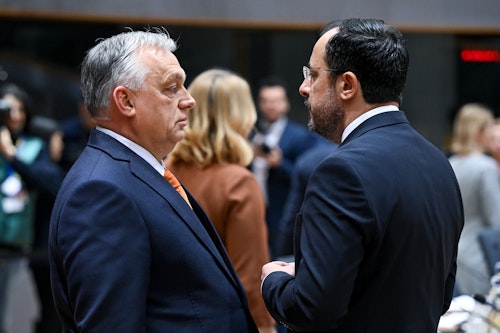
Zelenskyy's visit with King Philippe ended
President Volodymyr Zelenskyy's private audience with the King of the Belgians, King Philippe, has ended.
"The King received the President of Ukraine, Zelenskyy, in an audience at the Royal Palace of Brussels," the Belgian Royal Palace posted on X.
🇧🇪🇺🇦 Le Roi a reçu le Président de l’Ukraine, @ZelenskyyUa, en audience au Palais royal de Bruxelles. 🤝 pic.twitter.com/piNjF85vHD
— Belgian Royal Palace (@MonarchieBe) March 6, 2025
Orbán warns Europe will have to 'absorb costs' after US temporarily halts aid
"With the US cutting back aid, Europe must now decide whether to fund Ukraine's war effort alone," Hungarian government spokesperson Zoltan Kovacs said in a post on X.
"The majority of EU leaders believe Europe should not only continue support but also absorb the costs the US has stopped paying," Hungary's Prime Minister Viktor Orbán claimed.
The debate on Europe's defence spending has wrapped up, with leaders discussing Ukraine's future next.
⚠️ "Most European leaders argue that Ukraine must continue the war—not only maintaining support but also taking over the financial and military burden the U.S. has reduced," said @PM_ViktorOrban at the EU summit in Brussels.
— Zoltan Kovacs (@zoltanspox) March 6, 2025
🎥 During a break in the talks, the prime minister… pic.twitter.com/cTsSIRX4u9
Greek prime minister leaves the summit early
Greek Prime Minister Kyriakos Mitsotakis has left the summit early, ahead of a vote of no confidence in his government tomorrow over its handling of a 2023 train crash. His exit comes as leaders in the room seal the joint conclusions on defence and move to the debate on Ukraine's future.
Greece will be represented by Cyprus in the remainder of the talks, sources tell Euronews.
Photo courtesy of Associated Press (AP).
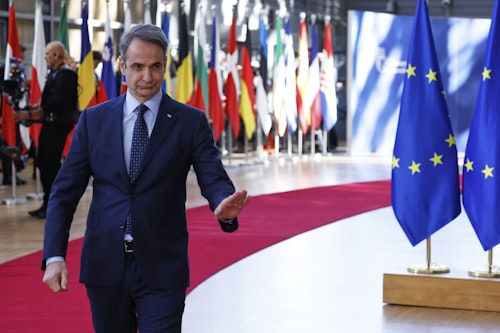
Leaders agree defence conclusions, start debate on Ukraine
The 27 leaders have just agreed on the joint conclusions on defence and have begun their debate on Ukraine, which is expected to be much more contentious due to Viktor Orbán's veto threat.
Stay tuned for updates.
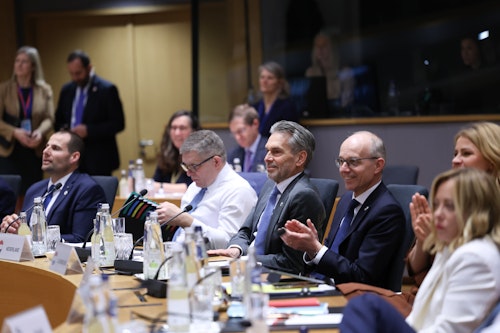
US and Ukrainian officials to meet for talks in Saudi Arabia next week - reports
American and Ukrainian delegations will meet in Saudi Arabia next week for talks, AFP reports.
According to the agency, US envoy Steve Witkoff told reporters on Thursday the talks, which could take place in Riyadh or Jeddah, would address a potential ceasefire with Russia and a "framework" on a longer agreement.
"The idea is to get down a framework for a peace agreement and an initial ceasefire as well," Witkoff said, according to AFP.
Fox News' senior White House correspondent Jacqui Heinrich earlier reported that Witkoff along with US Secretary of State Marco Rubio and National Security Advisor Mike Waltz are expected to be part of the American delegation, while Head of President Zelenskyy's office Andrii Yermak is expected to be part of the Ukrainian delegation.
ReArm Europe 'not the end of the game' for defence spending: French minister
Benjamin Haddad, France's Europe minister, welcomed the proposals from the Commission to boost defence spending as a "step in the right direction", but said that more is needed.
"It's not the end of the game, there are other discussions to be had on the European Stability Mechanism, and perhaps in the longer term, a discussion on Eurobonds, also to be had with Germany when there's a government," he said.
Fresh options are expected in the White Paper on Defence to be released on 19 March.
No need for a coffee break this time
The debate on Ukraine has yet to begin, but there’s significant anticipation around Hungary’s stance, Gerardo Fortuna reports.
In December 2023, a veto from Prime Minister Viktor Orbán on Ukraine’s EU accession talks was circumvented using a "coffee break" strategy—devised by then-Chancellor Olaf Scholz.
The German leader suggested that Orbán step out of the room briefly, which allowed the decision to pass unanimously without Orbán technically endorsing it.
Could the same tactic be used this time? "Frankly, we’re not at the level of [needing] the coffee," an EU diplomatic source said optimistically, suggesting the situation isn’t as tense as before.
On discussions regarding Ursula von der Leyen’s ReArm plan, the source added, "we are not at the stage where discussions are very concrete. We’re still talking about principles."
Norway to dramatically increase its aid spending to Ukraine
Norway will boost its aid to Ukraine by more than double, Prime Minister Jonas Gahr Støre said on Thursday.
The Nordic country, which has seen increased income into its government fund as a result of its gas sales to Europe, has long been pressured to increase its aid.
Government and opposition leaders agreed to raise the funding package of 35 billion NOK (2.98 billion EUR) to 85 billion NOK (7.23 billion EUR), according to press agency Reuters.
The outstanding issues in the defence talks
We're now hearing that there are two outstanding issues in the defence part of the joint conclusions, which leaders are currently discussing.
First, the fiscal rules, officially known as the Stability and Growth Pact. A growing group of countries wishes to launch a reform of the entire text, which was revamped just a few years ago. During those negotiations, Poland and Italy pushed for a "golden rule" to exempt military expenditure from the maximum levels of deficit and debt, which, if exceeded, can lead to punishments from the European Commission. Back then, Germany and the Netherlands said a firm "no", and the "golden rule" was discarded.
Now, it seems, Germany is after this very same flexibility and pushes for a fully-fledged reform of the Pact. It's unclear at this stage if enough countries would back the call to launch the process.
The second issue is about the origin of threats the EU is facing. The latest draft reads: "... the security of Europe as a whole, in particular as regards the EU’s eastern border, considering the threats posed by Russia and Belarus." Countries from Southern Europe, led by Spain, want to have a reference of the threats coming from all borders, not exclusively the Eastern flank.
Zelenskyy: ‘Real and lasting peace’ only possible through EU-US-Ukraine cooperation
“The war must end as soon as possible,” Ukrainian President Volodymyr Zelenskyy said after a side meeting with French leader Emmanuel Macron, warning that real and lasting peace is only possible through cooperation between Ukraine, Europe, and the US.
Zelenskyy and Macron discussed the upcoming meeting on March 11, where military representatives of the so-called “coalition of the willing” countries will convene to discuss greater efforts “to ensure reliable security in the context of ending this war".
The Ukrainian leader also thanked his French counterpart for his support for Ukraine and the need for “more substantial steps to protect our entire Europe".
I had a meeting with French President @EmmanuelMacron on the sidelines of the European Council meeting today in Brussels. I thanked Emmanuel for his clear and principled stance in support of Ukraine and the need for new, more substantial steps to protect our entire Europe—our… pic.twitter.com/lulIKiXAKI
— Volodymyr Zelenskyy / Володимир Зеленський (@ZelenskyyUa) March 6, 2025
Lithuanian President calls for 3% of GDP target for defence spending
Writing on X, Lithuanian President Gitanas Nausėda has called for a defence spending target of 3% of GDP for EU member states.
Twenty three of the EU's 27 member states are also members of NATO, which has a defence spending target of 2% of GDP. Yet, seven of those 23 countries do not meet that target, according to NATO's latest estimations.
NATO secretary-general Mark Rutte recently said allies could face an increase in defence spending of up to 3.7% of their GDP unless they manage to ramp up joint procurement through the alliance's existing programmes.
As part of the five-point proposal on Europe's rearmament unveiled by European Commission President Ursula von der Leyen on Tuesday, the EU executive has proposed triggering an exemption to the bloc's fiscal rules to give member states more leeway to spend on defence.
That could help EU countries spend up to 1.5% more of their GDP on defence spending, von der Leyen said.
But that prospect could be complex for those EU member states, such as Ireland and Austria, which follow a neutral or non-aligned foreign policy.
As we stand at a defining moment in history, we must strengthen Europe’s defense and intensify support for Ukraine now. As I stated at the EUCO meeting today, we need to:
— Gitanas Nausėda (@GitanasNauseda) March 6, 2025
- Significantly increase EU defense financing capabilities.
- Set a 3% GDP defense target for EU member… pic.twitter.com/mAlj7atErX
Czech PM convenes all political parties to talk defence capabilities
Petr Fiala, Prime Minister of the Czech Republic, is convening the leaders of all political parties on 13 March to discuss defence capabilities and security in response to the current international environment.
"There should be a broader political consensus on ensuring the security of our country's citizens, regardless of disagreements on other issues," Fiala wrote on X.
Na zajištění bezpečnosti občanů naší země by měla existovat širší politická shoda bez ohledu na nesoulad v ostatních tématech. Na čtvrtek 13. března jsem proto pozval předsedy všech politických stran zastoupených v Poslanecké sněmovně na schůzku o bezpečnostních otázkách a…
— Petr Fiala (@P_Fiala) March 6, 2025
Why is seizing frozen Russian assets so controversial?
One of the potential pathways towards ramping up the EU’s defence spending and financial assistance to Ukraine is by seizing the estimated €210 billion in frozen Russian assets held in the EU - but the prospect is highly divisive.
The bloc froze those assets in the wake of the February 2022 invasion and has already seized the windfall profits that those assets have generated since.
But Poland’s Donald Tusk and Lithuania’s Gitanas Nausėda have openly called for the assets themselves to be seized and channelled towards Kyiv, a plan fraught with legal obstacles. Others are highly sceptical given that the assets are considered Russia’s sovereign property and that confiscation could be in breach of international law.
Belgium, where the frozen assets are mainly held, is considered the strongest opponent to the plan, citing major legal risks and the possibility of destabilising the markets.
The Belgian prime minister Bart de Wever told reporters earlier this morning: “I advocate great caution when it comes to those frozen assets. I sometimes get the impression that not everyone really knows what they are about and what the nature of those funds is and who is the ultimate owner of those funds.”
De Wever added that the assets should "still be on the table" as part of the discussion around a "final deal for Ukraine", suggesting they could be used as bargaining chip i a potential future peace negotiation.
On Monday the Financial Times reported that France and Germany, long opposed to seizing the assets, are discussing with the UK and other countries ways in which they could be used.
A senior EU official said that given the gravity of the situation there were "no more taboos" from the bloc's perspective and that the prospect of seizing the assets was "still on the table."
Italy endorses German proposal to review fiscal rules: Sources
According to diplomatic sources, the Italian government agrees with the possibility of excluding defence spending from the calculation of the deficit-to-GDP ratio. Italy also welcomes Germany’s proposal to go further and work toward a full revision of the Stability Pact.
But Rome is against redirecting cohesion funds toward defence, one of the options floated in the Commission's ReArm plan.
Finally, a "lexical" spat: Italy is not happy with the 'ReArm Europe' name because it does not reflect the full scope of what defence and security entail, which is much broader than just weaponry, including cybersecurity, infrastructure, and research and development.
France to continue sharing military intelligence with Ukraine
France will keep providing Ukraine with military intelligence after US officials said they had paused intelligence sharing between Washington and Kyiv.
French Defence Minister Sebastien Lecornu told France Inter on Thursday that the country would continue its intelligence sharing with Ukraine.
"Our intelligence is sovereign," Lecornu said. "We have intelligence that we allow Ukraine to benefit from."
France to continue sharing intelligence with Ukraine after US freeze
Washington on Wednesday confirmed it had temporarily paused the flow of intelligence to Kyiv on Wednesday, just days after suspending military aid.
EIB set to broaden defence investment scope in two weeks' time
The European Investment Bank's board of directors will examine a proposal to further expand eligibilities to boost financing for defence projects on 21 March, Nadia Calviño said on Wednesday.
This will ensure that "excluded activities are more precisely defined and as limited as possible in scope", the head of the EU's lending arm told the EIB Group Forum.
If the proposal is approved by shareholders — meaning, EU member states — later this month, this will constitute the second time in a year that the EIB's mandate is expanded to allow investments in predominantly military projects.
Calviño said on Wednesday that a further expansion would enable the bank's current defence programme, worth €8 billion to 2027, to be embedded "into a new cross-cutting and permanent public policy goal".
EIB set to broaden defence investment scope later this month
The proposal, tabled by the bank’s President Nadia Calviño, will be examined on 21 March. #EuropeNews
European Parliament president appears to feel sidelined over new defence package
The European Parliament's Roberta Metsola seems to feel sidelined in the decision-making on the new up to €150 billion instrument proposed by von der Leyen to fund defence and security.
During the last EU elections (June 2024), the parliament saw a big shift to the right and "more and more people voting out of a sense of frustration and desperation", Metsola told EU leaders on Thursday.
"Working through the European Parliament, especially on decisions of this magnitude, is a way of fostering trust in our Union," the Parliament chief said.
“Yes, we need swift action, but acting together is the only way of ensuring broad and deep public backing,” she added, promising that the Parliament would adapt to the demanding circumstances by working quickly, efficiently, and effectively.
The EU Commission has proposed that the new financial instrument be created under Article 122 of the treaties, which allows the EU executive to submit a text directly to the Council in emergencies – thus bypassing the European Parliament.
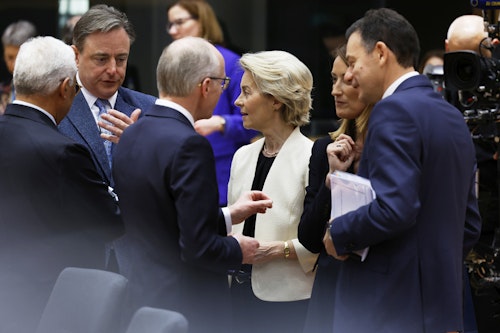
Source: AP Photos
Discussion with Zelenskyy lasted 1.5 hours
The discussion between EU leaders and President Volodymyr Zelenskyy lasted about one hour and a half and focused on diplomacy and defence, according to an EU official, who described the talks as "open."
"President Zelenskyy updated leaders on the situation on the ground, his ongoing diplomatic efforts and expectations for the future in view of a just, comprehensive and lasting peace," the official said.
In a post on social media, the Ukrainian leader listed some of the topics he touched upon with the 27 leaders: the delivery of air defence systems, weapons and ammunition, assistance for Ukraine's defence industry, the accession process and sanctions on Russia. He then repeated his message of gratitude that he had expressed upon arrival in Brussels.
"It is very important that Ukrainians are not alone – we feel it and know it," he wrote.
During a meeting with European Commission President @vonderleyen and @eucopresident António Costa in Brussels, we discussed strengthening the defense capabilities of Ukraine and all of Europe.
— Volodymyr Zelenskyy / Володимир Зеленський (@ZelenskyyUa) March 6, 2025
Air defense, weapons and ammunition for Ukraine, timely deliveries, strengthening… pic.twitter.com/qRIll3liOL
Ireland ‘open’ to sending peace-keeping troops to Ukraine, says Taoiseach Micheal Martin
Ireland is a militarily neutral state but has a long-standing peace-keeping tradition which doesn't contravene neutrality rules, Euronews' Shona Murray reports.
The Irish premier says Ireland will do "everything possible to help" Ukraine and European Security.
Irish Taoiseach Micheal Martin says Dublin will consider sending peace-keeping troops in the event of a peace deal. But as a neutral, non-NATO country, Ireland does not have the capabilities to be part of a deterrent force.
“We're willing to do everything we possibly can to help," he told reporters at the summit.
"Obviously, there are two strands. One would be in terms of cessation of hostilities and if there was a peacekeeping monitoring mission required Ireland would look at that and see what we could do to help in that situation," he said.
However, Martin made clear Ireland’s limitations regarding any future European presence in Ukraine.
"We would not be part of a deterrent force, and we don't have that military capability.’’
"We have been involved in peacekeeping for decades in different locations across Europe and the world and Africa and Lebanon. So we're open in the future to this," he said.
He said Ireland welcomes the "innovative" approach to the defence spending mechanisms put forward by the Commission in the ReArm Europe proposals.
“A number of flexible, pragmatic, but strong proposals have emerged from the Commission in the context of flexibilities and disability and Growth Pact, for spending and the €150 billion loan facility, also the potential of some member states to utilise other mechanisms such as cohesion funds."
"All of that is an innovative approach to create a resource base for member states to improve their security capability and defense capabilities."
He said Ireland would avail of joint procurement part of the package to purchase security instruments.
"We're focusing on cybersecurity threats, maritime security threats, working with other Member States; we're procuring a premier radar system, and we're likely to be in that field a joint procurement model," Martin concluded.
Top socialist MEP: Forget Trump and choose joint borrowing
In an exclusive interview with Euronews, Raphaël Glucksmann, a prominent French socialist MEP, urged the 27 EU member states to abandon their reliance on the United States.
"What we need to do now is exactly what we have done in times of Covid: common EU money, joint borrowing, and coordination in investments in defence,” the lawmaker told Euronews.
“Otherwise, we have 27 defences and a total lack of efficiency or coordination of money,” he added.
Glucksmann also recommended swift action on using frozen Russian assets to mobilise funds to support Ukraine and halting imports of Russian LNG gas.
Listen to today's episode of Radio Schuman, Euronews' daily podcast on EU affairs.
Glucksmann to European leaders: Forget Trump, choose joint borrowing
Ahead of the Extraordinary European Council meeting in Brussels, Glucksman urges EU leaders not to rely on the US anymore and to invest time and resources in c…
Upcoming increase in defence spending not a concern for ECB
An increase in defence and infrastructure spending could "add to growth", Christine Lagarde said following the European Central Bank's (ECB) March meeting, where it cut interest rates for the sixth time since June.
“A boost in defence and infrastructure spending could also raise inflation through its effect on aggregate demand,” Lagarde said. “But inflation might surprise on the downside if monetary policy dampens demand by more than expected,” she added.
Check Euronews’ Eleanor Butler story here:
ECB cuts rates for sixth time since June despite sticky inflation
The European Central Bank cut its benchmark interest rate by a quarter point to 2.5% on Thursday as inflation nears 2% and growth remains weak.
Leaders finish lunch and Zelenskyy leaves the room
EU leaders have finished their lunch and President Volodymyr Zelenskyy has left the room, we've just heard.
Leaders will soon begin their debate focus on defence spending. After that, they will turn to the issue of Ukraine's future, which is set to be more contentious due to Viktor Orbán's and Robert Fico's opposition. Prior to the summit, diplomats indicated that joint conclusions could be adopted with only 25 or 26 member states if the resistance continues till the end.
Meanwhile, Zelenskyy will head to a private audience with the King of Belgians.
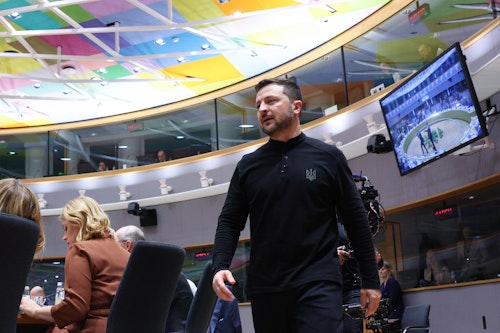
'Historical moment for us': Defence Commissioner Kubilius
Andrius Kubilius, the European Commission for Defence and Space, told the European Parliament's Committee on Industry, Research and Energy (ITRE) on Thursday morning that the EU executive is "elaborating special regulation" to make ReArm Europe's €150 billion instrument possible.
Kubilius described the instrument, which will be established through Article 122 of the Treaty of the EU and thus allow member states to approve it without asking MEPs for their backing, as "very good" because it will provide member states with "attractive loans".
Under the proposal, the Commission will raise the money on the markets but the loans will be backed by the headroom in the bloc's budget.
"Triple A rating and 45-year maturity, for quite a number of member states should be very, I hope, attractive," Kubilius said, adding that it would be "very similar to what was done in the pandemic".
Overall, the ReArm Europe plan unveiled by Commission chief Ursula von der Leyen on Tuesday "has very clear historical significance", Kubilius said, and represents a "historical moment for us".
The Lithuanian politician also said that the EU "should be very grateful to our partners in the US if they would continue to assist us" in strengthening defence capabilities.
He also joked that the ReArm Europe proposal is creating a "challenge" for his team to "adapt the language of the White Paper" on Defence, that is is set to be released on 19 March.
Finland's PM says 'Ukraine is one of us'
The EU needs to decide faster on giving additional military support to Ukraine, Finland's PM Petteri Orpo said ahead of the meeting with his 26 counterparts.
Orpo stressed that the bloc has to send a clear message after today's meeting: "Ukraine is one of us," he said.
"Europe must be stronger. If we succeed, we no longer have to ask: Who is next? Because no one will be," Orpo added.
🇫🇮 Prime Minister @PetteriOrpo at the Special #EUCO:
— Finland in EU (@FinlandinEU) March 6, 2025
"Ukraine is one of us. Europe must be stronger with a powerful European pillar of NATO. If we succeed, we no longer have to ask: Who is next? Because no one will be." 🇪🇺🇺🇦 pic.twitter.com/N5ynbJMqgk
New draft conclusions offer concession to Fico but not Orbán
We're now reading the latest draft of the summit's conclusions, which were fined-tuned by ambassadors in a meeting earlier today.
The section on Ukraine has added an extra bullet point about gas transit through Ukraine. It reads: "The European Council calls on the Commission, Slovakia and Ukraine to intensify efforts towards finding workable solutions to the gas transit issue, including through its resumption."
Slovakia's Prime Minister Robert Fico has harshly criticised President Volodymyr Zelenskyy for his decision to shut down the transit of Russian gas through Ukraine, which Zelenskyy considers "blood money". Gas stopped flowing on the last day of 2024. Since then, Fico has called on the European Commission to mediate on its behalf and threatened to derail the EU's support for Ukraine if the situation persists. Several rounds of talks between the parties have taken place, but no breakthrough has yet been achieved.
The conclusions, though, do not seem to include any concession to the other leader threatening to hijack the summit: Hungary's Viktor Orbán. The text still speaks of "peace through strength," military assistance and security guarantees for Ukraine, all of which the Hungarian leader opposes. The draft also retains a brief reference to the new initiative by High Representative Kaja Kallas to establish a new fund to rapidly bring weapons and ammunition into Ukraine's armed forces.
Zelenskyy meets new Belgian PM Bart De Wever, focuses on ‘defence needs’
Ukrainian President Volodymyr Zelenskyy and Belgian PM Bart De Wever have met on the sidelines of the special summit to discuss defence, a European peace plan and Ukrainian’s membership to the EU.
“During our talks, we focused particularly on defense needs, primarily the supply of artillery systems and ammunition, as well as investment in Ukraine’s domestic production of long-range drones and missiles,” Zelenskyy posted on X after the meeting.
Zelenskyy and De Wever also discussed Ukraine’s integration into the EU.
“I am grateful to Belgium for its unwavering support for Ukraine,” Zelenskyy said, particularly referring to Belgium’s decision to transfer F-16 fighter jets.
I met with Belgian Prime Minister @Bart_DeWever in Brussels. I thanked the government and all Belgians for their support, particularly for the decision to transfer F-16 fighter jets. We greatly appreciate these strong steps to protect Ukrainian lives.
— Volodymyr Zelenskyy / Володимир Зеленський (@ZelenskyyUa) March 6, 2025
I informed the Prime… pic.twitter.com/Y5tbOST9rm
What are EU leaders eating today?
As EU leaders brace for tough talks on boosting defence spending, they’ll be having lunch - this time, armed only with forks, Gerardo Fortuna reports.
On today's menu seen by Euronews: a winter vegetable and citrus fruit mousseline to start, followed by duck parmentier, and a sweet finish with pear and caramel entremet.
Let’s just hope the only thing getting roasted today is the duck.
Dutch Parliament divided over Commission's 'Rearm Europe' plan
The Dutch parliament appears not to be in favour of the European Commission's new defence plan, ReArm Europe, Dutch broadcaster NOS reports. This morning, the parliament voted on a motion not to participate in the billion-euro plan, Cynthia Kroet reports.
The vote ended in a tie. MP Joost Eerdmans, of the far-right party JA21 who filed the motion, was not present (because he was stuck in traffic). With one additional vote, the proposal would have received a majority.
Next Tuesday, a new vote will be held. The motion is backed by three of the four coalition partners PVV, NSC and BBB.
Zelenskyy won't hold press conference after the summit
Volodymyr Zelenskyy is not expected to hold a press conference after his participation in the special EU summit.
Zelenskyy usually speaks to journalists when he comes to Brussels, offering frank and straightforward answers to the many questions in the room. Last time he was here, in December, he made headlines when he announced the end of transit of Russian gas through Ukrainian territory, angering Hungary and Slovakia.
This time, though, the situation is completely different. Every word Zelenskyy says in public is now closely examined by the White House, which has asked the Ukrainian president to follow Donald Trump's lead without protestation. The tension remains high after the confrontation in the Oval Office last week, which prompted the US to temporarily halt military aid and information-sharing, two decisions that risk having disastrous consequences for Ukraine in its fight against the invading Russian forces.
Photo credit: Associated Press.
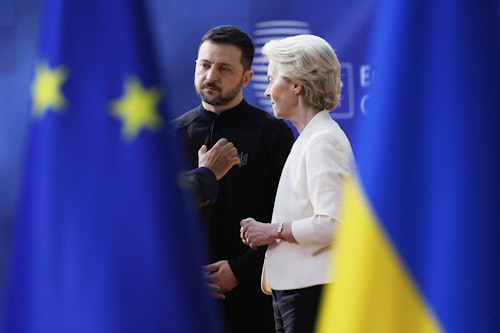
France and Hungary agree on need to strengthen European defence: Orbán
Hungarian Premier Viktor Orbán, who had dinner in Paris with French President Emmanuel Macron on Wednesday evening, said in a post on X that the two "agree that we must strengthen the defence capabilities of European nations".
He added that they also agree that "these efforts should empower member states rather than Brussels bureaucrats".
Before his bilateral working dinner with Orbán, Macron said in a televised address to the nation that Russia is now a “threat to France and Europe” and announced that he had decided “to open the strategic debate on the protection of our allies on the European continent by our (nuclear) deterrent.”
My meetings in France confirmed that while we may disagree on the modalities of peace, we do agree that we must strengthen the defence capabilities of European nations, & these efforts should empower member states rather than Brussels bureaucrats. pic.twitter.com/FDdZTuOnb8
— Orbán Viktor (@PM_ViktorOrban) March 6, 2025
EU countries must spend ‘as much as they think is right’ on defence, says Olaf Scholz
Olaf Scholz, Germany’s outgoing chancellor, welcomed the proposals unveiled earlier this week by the European Commission to boost defence spending as he arrived at the summit, including the new €150 billion instrument for loans and the exemption of defence spending from deficit calculations.
“I am in favour of us not just having this discussion for the next one or two years, but that we ensure in the long term that the states can spend as much on defence as they themselves and with their friends and allies think is right,” he said
“It is necessary for the necessary decisions to be made both nationally and in Europe,” he added. “Germany is preparing to strengthen its financial strength, including by changing the Constitution.”
This represents a volte-face for the country, which has had strict fiscal rules since 2009, and has been known as one of the most stringent so-called frugal countries in the bloc.
Scholz’s SPD party agreed earlier this week to back a new €500 billion special fund aimed at boosting infrastructure and defence spending put forward by CDU leader Friedrich Merz, who is set to become the country’s next leader.
Photo credit: AP Photo/Omar Havana
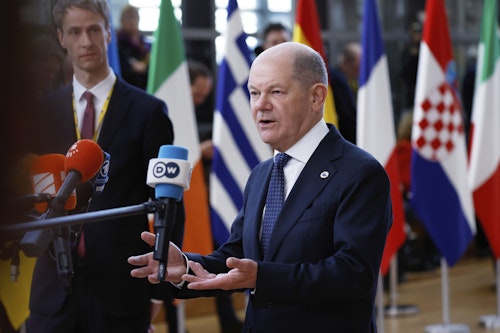
Special EU summit must deliver "certainties", says Spanish PM
Thursday’s special summit must deliver “certainties”, Pedro Sánchez, Spanish PM told reporters, including Euronews’ Aida Sánchez.
“This means that we need to convey a message of unity, a message of strength, and a message that we are going to move forward in strengthening a much freer Europe,” Sánchez said.
“We did this during the pandemic. We did it during the energy crisis, and we will do it again when what we are talking about is defence and security,” he added.
Sánchez also recalled how Ukraine and the EU need to be present during the peace negotiations for Ukraine.
“Peace in Ukraine is the security of Europe and therefore both must be present when we talk about what ceasefire is taking place and, above all, under what conditions and what path towards a just and lasting peace can take place in the coming years, the next few weeks, in the coming months,” the Spanish leader said.
🔴EN DIRECTO
— La Moncloa (@desdelamoncloa) March 6, 2025
Declaraciones del presidente del Gobierno, @sanchezcastejon, a su llegada al Consejo Europeo, #EUCO. https://t.co/GijuRAzFJc
The special EU summit has begun
The special EU summit has begun.
There are only two items on the agenda: Ukraine and defence spending. Ukraine will be the first item to be discussed in the presence of President Volodymyr Zelenskyy.
Reminder: this summit wasn't originally planned. It was convened as a reaction to the phone call between Donald Trump and Vladimir Putin and all the events that followed, which left the EU reeling.
Stay tuned for more updates.
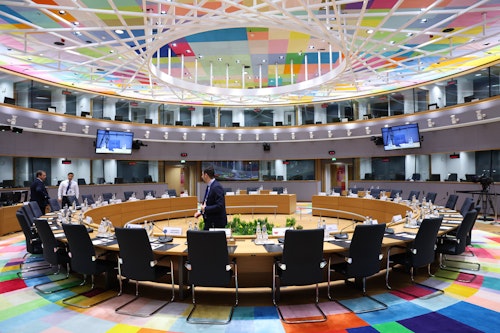
'History will penalise us': Lithuanian President dismisses Orbán's veto threat
Lithuanian President Gitanas Nausėda has dismissed the veto threats voiced by Hungary's Viktor Orbán and Slovakia's Robert Fico, the two most Russian-friendly leaders in the bloc. Ahead of the special summit, Orbán warned against any initiative that, in his view, could undermine Donald Trump's fast-moving diplomacy, such as further military assistance to Ukraine (which Trump has temporarily paused).
Asked if the summit could lead to conclusions agreed upon only by 25 member states, rather than by all 27, Nausėda said: "We will see, but you know, we have to take decisions. No matter (if there are) one or two countries that are opposing every time."
"We have to look for possibilities to implement decisions because otherwise the history will penalise us and we will pay very high costs for this inability to take decisions," he went on. "Unfortunately, it's lasting too long, our inability to take decisions. And now it's the time. Not tomorrow, not after tomorrow, now it's the time."
Asked if the EU could fill the gap left by Trump's suspension of military aid, Nausėda said: "I think it is possible but, of course, we have to accumulate our financial resources," he said. "It’s not so easy but it’s doable. This is our responsibility because, right now, we have to fill the gap which exists because of the new status quo in the United States."
Photo Credit: Associated Press.
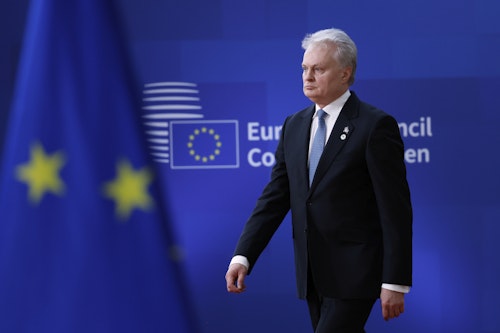
Hungary's veto would 'look bad' for EU show of unity on Ukraine, says Swedish PM
Hungary's possible use of its veto power "looks bad" for the EU's show of unity on Ukraine, Swedish Prime Minister Ulf Kristersson told reporters as he entered the summit.
Kristersson said Hungarian leader Viktor Orbán appeared to want to use his veto power to prevent the final conclusions on giving Ukraine security guarantees and more military support from being approved at the level of the 27.
"But the rules are as they are," the Swedish leader concluded in a very brief address to the media.
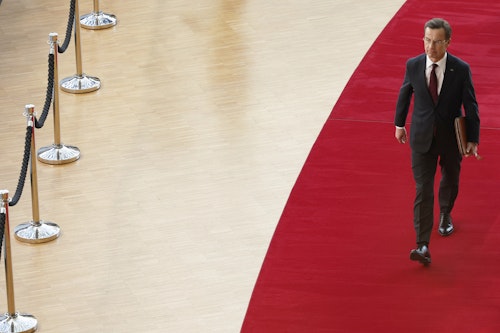
Source: AP photo
Brussels siding with Ukraine instead of member states: Hungary
Hungarian Foreign Minister Péter Szijjártó claimed on Thursday that "Brussels and Kyiv are continuously challenging Hungary and Slovakia’s energy security".
He told Denisa Sakova, Slovakia's deputy prime Minister, that the European Commission is "siding with Ukraine instead of protecting member states' interests", per a tweet from the Hungarian government's international spokesperson, Zoltan Kovacs.
❗️"Brussels and Kyiv are continuously challenging Hungary and Slovakia’s energy security," FM Péter Szijjártó stated.
— Zoltan Kovacs (@zoltanspox) March 6, 2025
⚠️ He criticized the @EU_Commission for siding with Ukraine instead of protecting member states' interests. "Of the four guarantees given for our energy… pic.twitter.com/Gq2evnGx47
Macron and Zelenskyy holding bilateral meeting
Emmanuel Macron is holding a bilateral meeting with Volodymyr Zelenskyy, the Elysée has confirmed.
The French leader, who joined a meeting of the Renew Europe group prior to the summit, skipped the press area to join the Ukrainian president.
Zelenskyy also held a bilateral earlier in the morning with Belgian Prime Minister Bart de Wever.
Today I assured @ZelenskyyUa that we will continue to support Ukraine. We cannot accept that decisions about Ukraine's future and Europe's security are made without Ukraine and its European allies. 🇺🇦 pic.twitter.com/T7JRI7K0aO
— Bart De Wever (@Bart_DeWever) March 6, 2025
'I hope we reach a political agreement' on Ukraine initiative: Kallas
The bloc's top diplomat, Kaja Kallas, said she hopes leaders will reach "a political agreement" on the initiative she has put forward to quickly boost military support for Ukraine either today or at the next summit to be held on 20-21 March.
"We really need to make them stronger so they are able to end this war on their terms and they need European support for this," she told reporters.
Under her initiative, EU member states would pledge to deliver, "as soon as possible in 2025", at least 1.5 million rounds of large-calibre artillery ammunition, air defence systems, missiles, including deep precision strikes, drones, and support to the regeneration of brigades.
The latest draft of the document, seen by Euronews, includes no set sum, although an earlier draft had earmarked €6 billion. The amount each member would have to contribute would be based on their current gross national income key. EU countries would also be allowed to choose whether to contribute "in kind" - by supplying the equipment- or in "cash".
Budapest and Bratislava have both said they would oppose any attempt to boost military support for the war-torn country with Hungary's Viktor Orban arguing it could hinder US-Russia talks.
Kallas said the initiative could go forward with a so-called coalition of the willing "so that one country can't block anybody else".
"We are still striving for having the unity of 27 members. If that’s not possible, Hungary can speak for themselves," she said.
Costa and von der Leyen speak of Europe's 'watershed moment'
We've just heard from António Costa, the president of the European Council, and Ursula von der Leyen, the president of the European Commission, who arrived at the summit with President Volodymyr Zelenskyy in an obvious sign of joint support.
Both Costa and von der Leyen spoke of the extreme danger that Ukraine, in particular, and Europe, as a whole, face over Russia's war of aggression and expansionist agenda.
"It's a very important moment to build on European security," Costa said. "Now we're here today to take decisions and deliver," he added, praising von der Leyen for her "Rearm Europe" plan to mobilise up to €800 billion in additional investment for the defence sector.
"Security and defence of Europe is not separated from Ukraine’s security and defence," Costa went on. "We're here to support Ukraine to achieve a comprehensive, just and lasting peace."
Costa then turned to Zelenskyy and said: "We are with you since day one, we continue with you now and we will continue in the future in the eventual peace negotiations when we decide that (it's) the right moment to negotiate and, most important, in the future as a member state of the European Union."
Von der Leyen argued that "extraordinary times" called for "extraordinary measures" and stressed the importance of pursuing "peace through strength," meaning empowering Ukraine with further military and financial assistance in its "existential fight" for its territorial integrity and sovereignty.
"This is a watershed moment for Europe and Ukraine is part of our European family; it's also a watershed moment for Ukraine," she said. "Europe faces a clear and present danger and therefore Europe has to be able to protect itself, to defend itself, as we have to put Ukraine in a position to protect itself and to push for a just and lasting peace."
Photo credit: Associated Press.
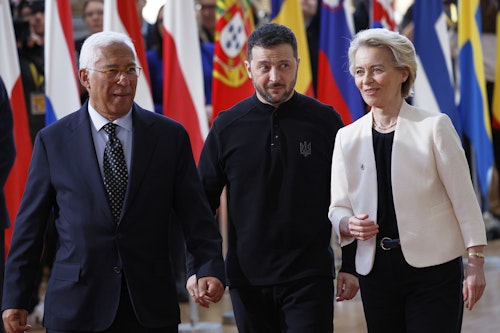
'There is no reason to be optimistic': Poland's Tusk
Donald Tusk, the prime minister of Poland, said that "there is no reason to be optimistic" but that he is "convinced" Europe understands the challenges ahead.
He added that "there is no doubt" the new position of the American administration of Donald Trump on Ukraine, as well as the "arms race started by Russia, pose new challenges for us" and that "Europe must win this arms race".
Boosting the continent's defence, Tusk went on, should help to "improve transatlantic relations".
"Maintaining NATO and the alliance with the United States must be our absolute priority," Tusk also said.
He told reporters that he would urge his fellow EU leaders to bolster the eastern flank with more troops on the border with Russia and Belarus.
Volodymyr Zelenskyy: 'We're thankful that we're not alone'
Volodymyr Zelenskyy has just arrived at the EU summit accompanied by António Costa and Ursula von der Leyen. Speaking to reporters in a brief doorstep, the Ukrainian president expressed his gratitude for the political support he and his country received after the clash with Donald Trump at the White House.
"I want to thank all European leaders for such signals of strong support," Zelenskyy said. "From the very beginning of the war. During all this period, and last week, you stayed with us."
"We're very thankful that we're not alone," he added. "These are not just words; we feel it. It’s very important (that) you made a strong signal to Ukrainian people, to Ukrainian warriors, to civilians, to all our families."
"It's great that we're not alone. We feel it and we know it. Thank you so much for everything."
Zelenskyy is expected to take part in the first half of the summit, which will be devoted to Ukraine's future. After that, he will leave the building and hold an audience with the King of Belgians.
Photo Credit: Associated Press.
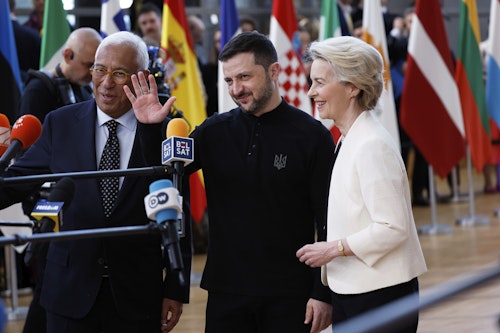
Latvian PM: €800 billion defence package is only a ‘first step’
Member states need more flexibility in budget spending and defence, Latvian Prime Minister Evika Siliņa told reporters ahead of the special summit in Brussels.
“We see good proposals from von der Leyen, but we see it as just one step. We need more steps going forward,” Siliņa said, referring to the €800 billion defence package presented by the EU Commission on Tuesday.
The Latvian PM pledged to send “a strong signal to our military industry” that the EU sees it as part of the economy. But Siliņa also stressed the importance for the bloc to increase defence spending beyond the minimum 2% NATO target agreed in 2014.
“We all Europeans understand what it means if Russia will just rearm itself and then after some years they can step again to some other countries,” she added.
'Spend, spend, spend on defence': Denmark's Frederiksen
Danish leader Mette Frederiksen told reporters upon arrival that the "most important thing now is to be very frank and rearm Europe".
"I don't think we have a lot of time. Spend, spend, spend on defence and deterrence that’s the most important message and at the same time, of course, continue to support Ukraine," she added.
She would not be drawn to comment on Donald Trump's most recent comments on Greenland, the autonomous territory of Denmark, which the US President has repeatedly said Washington could seek to acquire for security reasons.
Lithuanian President pitches 'political' date for Ukraine's EU membership
Lithuanian President Gitanas Nausėda has arrived at the summit with a new proposal: he wants the EU to agree on an "orientational date" for Ukraine's EU membership.
"For example, 2030, January 1st," he said.
Nausėda said the date would not be "legal" but rather a "political commitment to set the path and send very clear guidelines (message) to our friends" in Ukraine. "They need our support: military, financial and political," he said.
The European Commission, which oversees the accession process, has consistently rejected setting a fixed date for the accession, arguing the negotiations are "merit-based" and need to evolve according to the progress made by each candidate. Last week, in Kyiv, Ursula von der Leyen praised Ukraine's efforts and said that, should momentum continue, the country could join "earlier" than 2030.
Germany's next Chancellor meets EU leadership
Friedrich Merz, the conservative politician poised to be Germany's next Chancellor, won't be in the room today when the 27 EU leaders meet to discuss Ukraine's future and defence spending. Germany's place will be occupied by the incumbent, Olaf Scholz, who's on his way out.
However, Merz, who is fast-tracking negotiations with Scholz's socialist party to establish a new coalition government as soon as possible, has traveled to Brussels to meet with the bloc's leadership in a bid to build early relations. In the space of 24 hours, Merz met with Ursula von der Leyen, the president of the European Commission; Kaja Kallas, the High Representative; and António Costa, the president of the European Council.
Merz also attended a meeting of his party, the centre-right European People's Party, and met with Mark Rutte, the Secretary General of NATO.
Germany has a crucial role in the European Union. Important discussion this morning with @_FriedrichMerz on the challenges Europe is facing. pic.twitter.com/ECHnvXKt0G
— António Costa (@eucopresident) March 6, 2025
Europe should do 'whatever it takes' to ensure its security, says Weber
The centre-right European People's Party (EPP) is in favour of a strong Europe capable of defending itself, its German leader Manfred Weber told journalists ahead of a special meeting in Brussels, Euronews' Vincenzo Genovese reports from the ground.
Weber, who belongs to the same political party as von der Leyen, has backed the EU Commission’s plan for rearming the continent and mobilising up to 800 billion euros.
“For us, the investments needed are needed. We have to do them, whatever it takes. That was the message to Ukraine, and “whatever it takes” is now the message to secure the European security,” he said.
The EPP leader also backed joint efforts on security and defence, in areas such as cyber defence, missiles and drones, arguing that the EU is more effective when it works together.
“Our message is if Europe is united, we are safer,” Weber added.
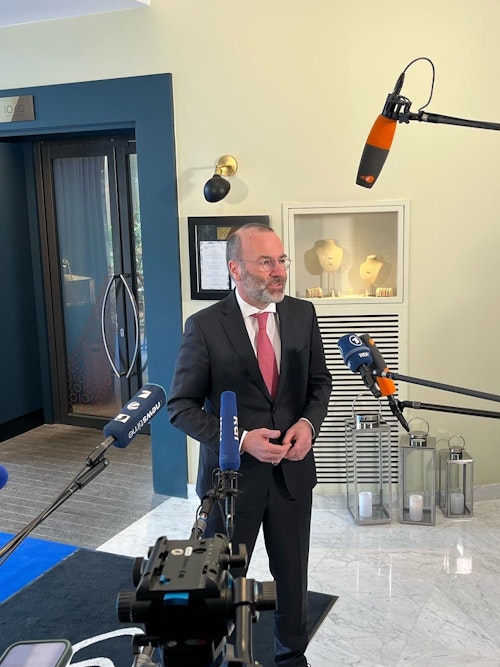
How can the EU unlock up to €800bn for its ‘rearmament plan’?
The EU has officially entered its "rearmament era" and is now ready to step up its efforts to support Ukraine in the short term and ensure its strategic autonomy to defend itself in the long term.
On Thursday, during a special meeting of EU leaders in Brussels, the 27 heads of state and government will discuss the five-point response plan, dubbed "REARM Europe", proposed by the EU Commission on Tuesday.
Lost in all the talk about defence spending? I've got you covered! Here's an explanation of the five different options the EU Commission has put on the table for member states to agree on.
How can the EU unlock up to €800bn for its ‘rearmament plan’?
The EU Commission has unveiled plans to borrow €150 billion to fund a major rearmament push. This joint borrowing proposal comes in the form of loans rather th…
What's on Thursday's agenda?
The bloc's 27 leaders will discuss the future of Ukraine, a candidate country to join the bloc, amid Donald Trump's maximalist demand that a deal to end Russia's war be struck as soon as possible.
It marks the first time that the heads of state and government meet in the same room since the American president held a 90-minute phone call with Vladimir Putin and decided to launch negotiations to end the three-year invasion.
For more insight, read Jorge Liboreiro's piece:
EU leaders meet to discuss Ukraine’s future as Trump pushes for deal
Thursday’s special summit was convened in reaction to Donald Trump’s unilateral decision to launch negotiations with Vladimir Putin. #EuropeNews
Welcome to a new Euronews live blog!
Good morning, Brussels! This is Paula Soler, Euronews' defence and finance reporter, who will be taking you along with my colleagues - Alice Tidey, Jorge Liboreiro, Mared Gwyn-Jones and Evelyn Dom - through a special summit of EU leaders in Brussels.
Get ready for a hectic journey as Ukrainian President Volodymyr Zelenskyy will join leaders in Brussels following recent tensions with US President Donald Trump, who is maintaining a temporary suspension of military aid and intelligence sharing with Kyiv.











